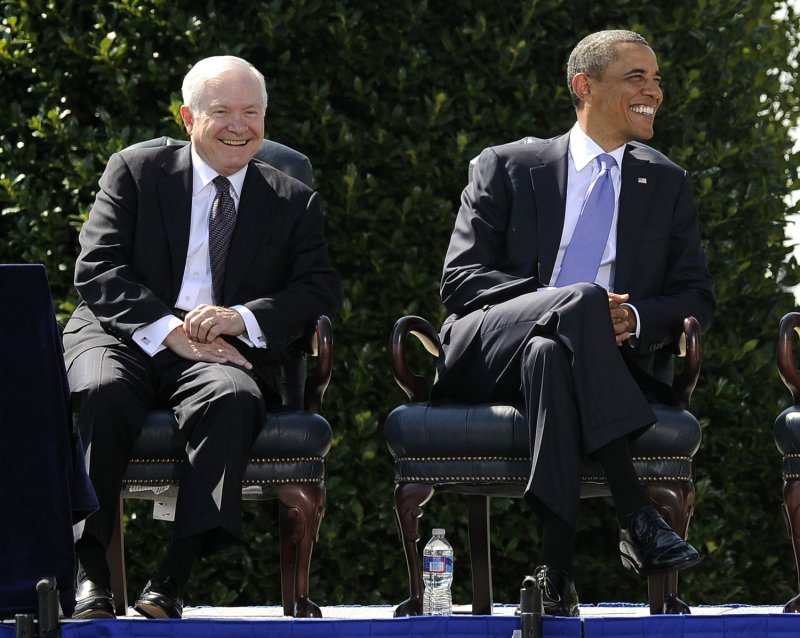Secretary of Defense Robert Gates and U.S. President Barack Obama participate in Gates' Armed Forces Farewell Ceremony on the Pentagon River Parade Field in Arlington, Virginia, on June 30, 2011. Former CIA Director Leon E. Panetta will become the 23rd Secretary of Defense, replacing Gates on July 1. UPI/Roger L. Wollenberg |
License Photo
WASHINGTON, Jan. 7 (UPI) -- In a forthcoming memoir, former U.S. Defense Secretary Robert Gates charges President Barack Obama with failing to trust his top military leaders.
Gates, who served as defense secretary for five years, first under George W. Bush and then for two years after Obama asked him to stay on, was largely seen as the rare nonpartisan figure in Washington. But, writes Gates, much of that was for public consumption and to present the public and the world with the appearance of a united American security front. In private, Gates writes, he was "seething" and "running out of patience" with a dysfunctional Washington.
While Gates offers conflicting takes, the Washington Post's Bob Woodward said there was a fairly warm personal sentiment between the two men, who he interviewed for his own book, "Obama's Wars." Obama, in turn, lauded Gates, saying he had served "extraordinarily well."
Gates maintains in the 546-page memoir "Duty," due to be published by Knopf Jan. 14, Obama was committed to supporting the troops but had lost faith in their Afghanistan mission almost immediately after signing off on sending an added 30,000 soldiers to the country ahead of a planned drawdown that is presently in place.
"I never doubted Obama's support for the troops, only his support for their mission," Gates writes, adding, the president "doesn't believe in his own strategy, and doesn't consider the war to be his. For him, it's all about getting out."
He reserved even sharper criticism for Vice President Joseph Biden, who Gates accused of "poisoning the well" between Obama and the military's top brass, including Chairman of the Joint Chiefs Adm. Mike Mullen and Army Gen. David Petraeus, who at the time was overseeing both the wars in Iraq and Afghanistan.
Biden was one of the administration's top critics of the Afghanistan surge, a policy Obama himself was deeply skeptical of, though he eventually signed off on a slightly more limited version of it shortly after taking office. Woodward's accounts depicted a commander in chief who feared, as Gates writes, "being gamed" by the military to draw out the conflicts Obama had promised to end.
Though he charged former Secretary of State Hillary Clinton was opposed to the 2003 Iraq surge because of political considerations while running against Obama, he offered glowing praise of her time in Obama's cabinet.
"I found her smart, idealistic but pragmatic, tough-minded, indefatigable, funny, a very valuable colleague, and a superb representative of the United States all over the world," he said.















